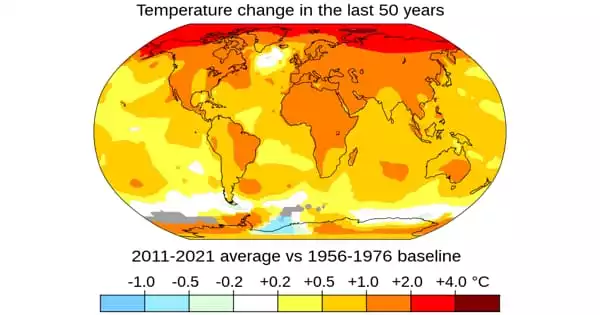One of the most important concerns confronting our planet and its inhabitants is addressing climate change. Climate change is defined in bio and geophysical terms as changes in the averages and variability of surface temperature, precipitation, and wind over time, as well as associated changes in the Earth’s atmosphere, oceans and natural water supplies, snow and ice, land surface, ecosystems, and living organisms. What distinguishes present global climate change from previous changes is the causative influence of human activity (also known as anthropogenic forcing) and the current and expected severe changes in climate around the world.
According to recent research, climate change might increase the financial toll of floods in the United States by more than a quarter by 2050, with underprivileged communities bearing the brunt of the impact.
The University of Bristol-led study, published in Nature Climate Change, used advanced modeling techniques to produce the massive calculations, which predicted that average annual flood losses will rise by 26.4 percent in fewer than 30 years, from US$32 billion to US$40.6 billion.
The team of prominent international flood risk scientists created a complete, high-resolution assessment of flood risk in the United States for the first time by analyzing national property asset data and thorough flood projections. The financial loss estimates, which include damage to houses, companies, and their goods, were calculated on 2021 currency values, so the actual numbers would most certainly be substantially higher when inflation is included in.
Climate change combined with shifting populations create a double whammy of flood and peril, and the cost ramifications are startling. Our innovative methodologies, which make use of cutting-edge flood models, provide a considerably more realistic picture of future floods and how it will effect populations.
Dr. Oliver Wing
While the research shows that poorer towns with a proportionally bigger white population are currently in the most danger, future increases in flood risk will have a higher impact on African American communities on the Atlantic and Gulf coasts.
Predicted population change was also shown to have a significant impact on flood risk, resulting in four-fold increases compared to the effects of climate change alone, and sending prices much higher.
“Climate change combined with shifting populations create a double whammy of flood and peril, and the cost ramifications are startling,” said lead author Dr Oliver Wing, Honorary Research Fellow at the university’s Cabot Institute for the Environment.
“Traditional risk models rely on historical data, which does not represent expected climate change or provide enough depth.” Our innovative methodologies, which make use of cutting-edge flood models, provide a considerably more realistic picture of future floods and how it will effect populations.

“The mapping clearly shows that, in addition to the poorer White groups that bear the majority of the historical risk, Black communities will be disproportionately harmed in a warming world.” Both of these findings are extremely concerning. The study is a call to action for increased adaptation and mitigation efforts to lessen the terrible financial impact flooding has on people’s lives.”
It stated that increases in climate-enhanced exposure were especially concentrated along the US East Coast, with existing Texas and Florida inhabitants facing a roughly 50% increase in flood exposure by 2050.
In terms of increased flood risk owing to population growth, the researchers cited intensified construction on existing floodplains as “particularly severe in the currently sparsely populated central Prairie States and the Deep South.”
According to the study, even developments that are currently considered low risk may be in places where flood risk is predicted to increase in the future decades. The study was conducted in collaboration with experts from universities in New York, California, and Philadelphia.
Professor Paul Bates CBE FRS, co-author and Professor of Hydrology at the Cabot Institute for the Environment and School of Geographical Sciences at the University of Bristol, stated: “The current flood risk in Western society is already unacceptably high, but climate and population change threaten to significantly increase these losses. Because of the very short durations over which this increase will occur, we cannot rely on decarbonisation to lessen the risk, therefore we must adapt better, both now and in the future.”
According to the report, while poorer communities with a proportionally bigger white population are currently the most vulnerable, this is about to change. Future increases in flood risk are expected to have a higher impact on African-American communities on both the Gulf and Atlantic coasts.





